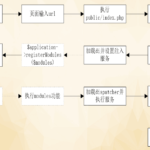phalcon没有像yii那些框架一样内置trace工具,所以我们只能自己搞。
在phalcon里有一个\Phalcon\Db\Profiler 类,这个类可以用来记录sql语句并计算消耗的时间。
那么如何使用它呢?
手册里其实已经提供了方法,总结如下:
1.向$di里注册profiler服务
$di->set('profiler', function(){
return new \Phalcon\Db\Profiler();
}, true);
2.注册db服务时,顺便注册下事件
$di->set('db', function() use ($di) {
//新建一个事件管理器
$eventsManager = new \Phalcon\Events\Manager();
//从di中获取共享的profiler实例
$profiler = $di->getProfiler();
//监听所有的db事件
$eventsManager->attach('db', function($event, $connection) use ($profiler) {
//一条语句查询之前事件,profiler开始记录sql语句
if ($event->getType() == 'beforeQuery') {
$profiler->startProfile($connection->getSQLStatement());
}
//一条语句查询结束,结束本次记录,记录结果会保存在profiler对象中
if ($event->getType() == 'afterQuery') {
$profiler->stopProfile();
}
});
$connection = new \Phalcon\Db\Adapter\Pdo\Mysql(array(
"host" => "localhost",
"username" => "root",
"password" => "secret",
"dbname" => "invo"
));
//将事件管理器绑定到db实例中
$connection->setEventsManager($eventsManager);
return $connection;
});
3.程序中调出sql记录
//执行一些查询
Robots::find();
Robots::find(array("order" => "name"));
Robots::find(array("limit" => 30));
//获取所有的prifler记录结果,这是一个数组,每条记录对应一个sql语句
$profiles = $this->di->get('profiler')->getProfiles();
//遍历输出
foreach ($profiles as $profile) {
echo "SQL语句: ", $profile->getSQLStatement(), "\n";
echo "开始时间: ", $profile->getInitialTime(), "\n";
echo "结束时间: ", $profile->getFinalTime(), "\n";
echo "消耗时间: ", $profile->getTotalElapsedSeconds(), "\n";
}
//直接获取最后一条sql语句
echo $this->di->get('profiler')->getLastProfile()->getSQLStatement();
via https://my.oschina.net/cxz001/blog/289776
最后更新于 2017年7月21日
相关博文
phalcon:跟踪sql语句






